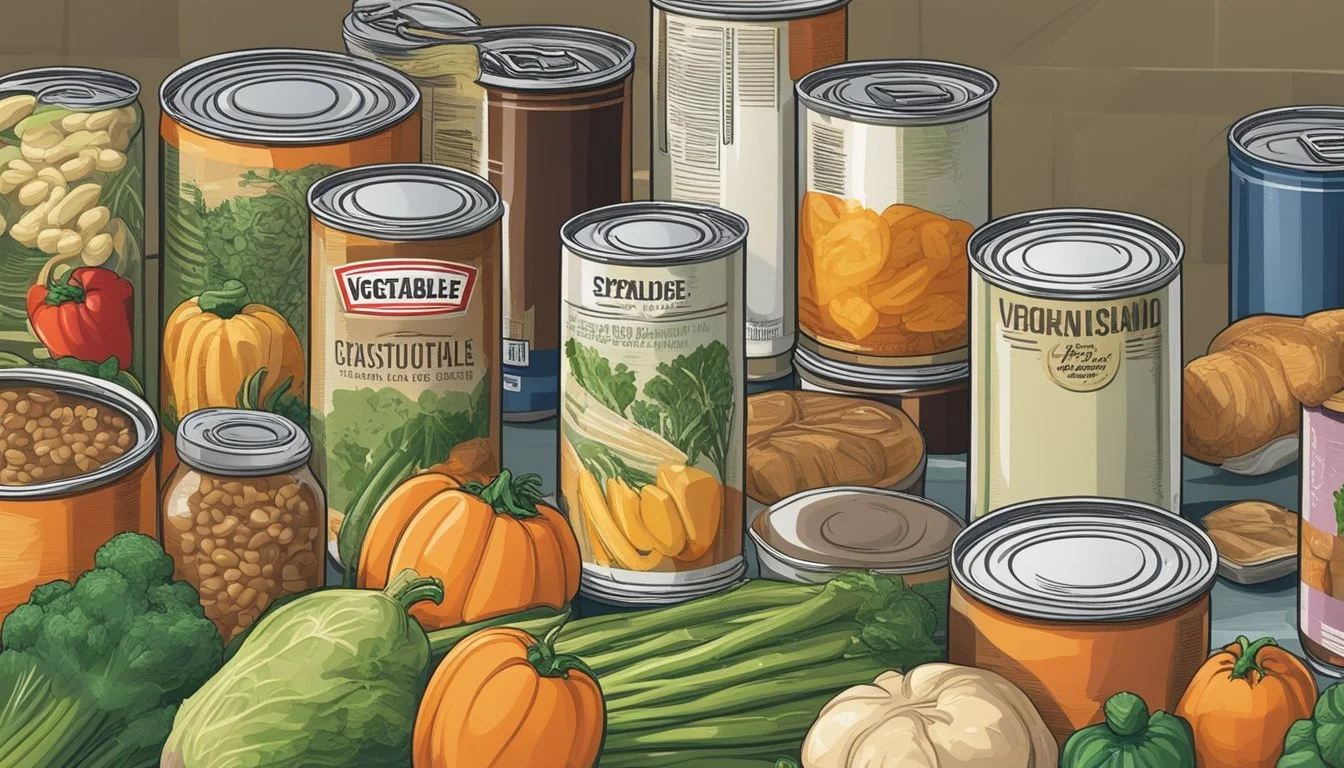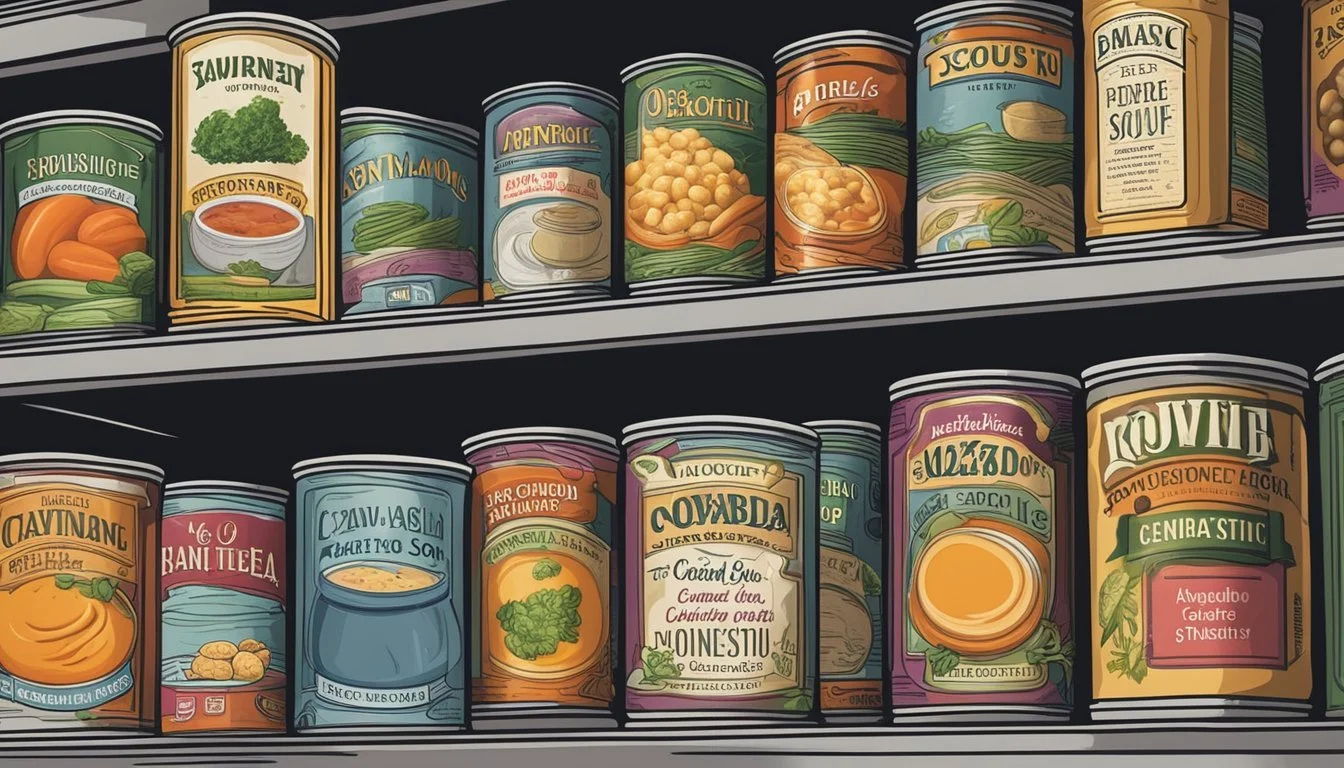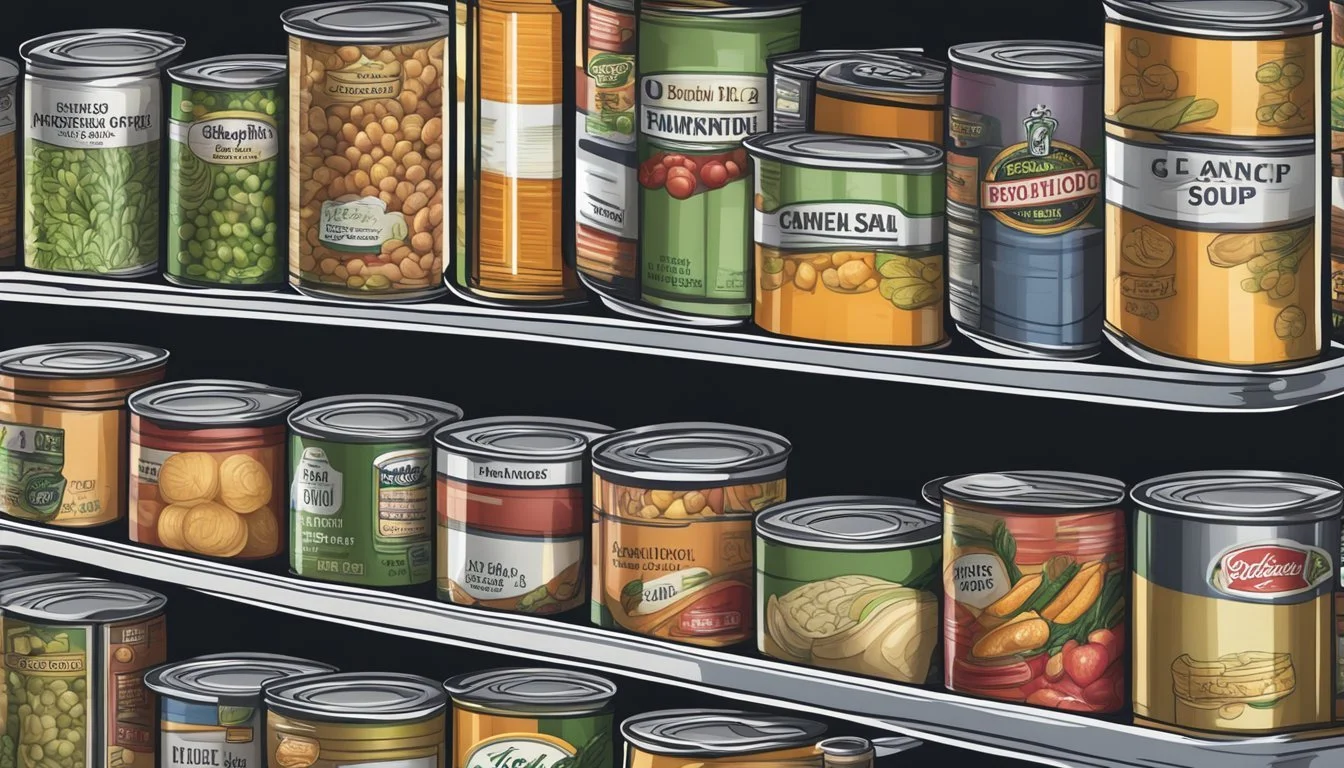Does Canned Vegetable Soup Expire?
Understanding Shelf Life and Storage
Canned vegetable soup is a pantry staple that many households rely on for quick and convenient meals. While the expiration date on the can provides a guideline for optimal quality, canned vegetable soup can often remain safe to consume well past this date if stored properly.
The quality of canned vegetable soup, including its flavor and texture, may diminish over time. To maintain the best possible quality, it should be stored in a cool, dry place away from direct sunlight. Ensuring the can is not dented, rusted, or leaking also plays a key role in its longevity.
Though the safety of the soup is largely assured due to the canning process, which prevents spoilage and bacterial growth, its overall appeal may decrease after a few years. Therefore, while you can eat expired canned vegetable soup, it’s wise to check the can's condition and the soup's taste before consuming it.
Understanding Canned Foods
Canned foods offer convenience and longevity, making them a staple for many households. This section focuses on the canning process and the types of canned foods available.
The Canning Process
Canning involves sealing food in airtight containers and heating them to destroy bacteria and enzymes that cause spoilage. This ensures that the food remains shelf-stable for extended periods. The process begins with selecting and preparing fresh ingredients.
Next, the food is packed into cans and sealed to prevent contamination. The sealed cans are then heated to a specific temperature for a set duration. This heating process kills bacteria, molds, and yeast, ensuring the food is safe to consume months or even years later. Proper sealing and sterilization are crucial to the shelf life of canned goods.
Types of Canned Foods
Canned foods encompass a wide range of products, each with its longevity and storage requirements. High-acid foods like tomatoes and fruits typically last 12 to 18 months. Low-acid foods like vegetables, meats, and soups can remain safe for two to five years when stored properly.
Some popular categories include canned vegetables like corn and green beans, canned meats such as chicken and tuna, and a variety of soups and stews. Low-acid foods tend to have a longer shelf life compared to their high-acid counterparts. To maximize shelf life, canned goods should be stored in cool, dark places with minimal humidity.
Expiration Dates Explained
Canned vegetable soup has multiple dates printed on its packaging. Understanding these dates helps ensure the soup's quality and safety.
Best-By, Use-By, and Sell-By Dates
Best-By Date: This date indicates when the product will be at its best quality. After this date, the flavor and texture may decline, but it doesn't necessarily mean the food is unsafe to eat. For instance, a vegetable soup might taste less fresh but remain consumable.
Use-By Date: This is the last date recommended for the use of the product while at peak quality. It's often found on perishable items, but for canned goods like soups, this date assures that the soup will be of the best possible flavor and quality within this timeframe.
Sell-By Date: Mainly for the store's reference, this date tells retailers how long to display the product for sale. It’s not a safety date. A can of vegetable soup past its sell-by date may still be safe for weeks or months if properly stored.
Understanding these dates ensures consumers can make the best decisions about the quality of their canned soups.
Shelf Life of Canned Foods
Canned foods have a long shelf life due to the canning process. Vegetable soups typically remain good for 2-5 years if stored correctly. The key to prolonging shelf life is proper storage conditions: cool, dry places with stable temperatures between 50°F and 70°F.
Quality may decline over time. Soups with added ingredients like cream may have shorter shelf lives, around 2-3 years. Keeping track of expiration dates helps manage this.
Proper storage and awareness of these dates enable consumers to enjoy canned soups with confidence.
Storage Conditions
The shelf life and safety of canned vegetable soup are significantly influenced by how it is stored. Factors such as temperature, light, and humidity levels play crucial roles in maintaining the quality of the soup.
Optimal Storage Practices
Canned vegetable soup should be kept in a pantry or storage area where the environment is controlled. Proper storage includes the following practices:
Temperature: Store the cans in a cool location, ideally between 50°F and 70°F.
Light: Minimize exposure to light to avoid degrading the nutrients.
Humidity: Keep the storage area dry to prevent rusting of cans.
Ensuring these conditions helps maintain the quality and safety of the soup for an extended period.
Impact of Temperature on Canned Foods
Temperature is a critical factor in preserving canned foods. High temperatures can cause the food inside the cans to spoil faster. Thus, the storage area should remain consistently within the recommended 50°F to 70°F range. Refrigerators are not necessary unless the can is opened.
Avoiding high temperatures is particularly important as it can compromise the seal integrity of the can, leading to contamination. Conversely, extremely low temperatures can cause cans to rust or burst.
Significance of a Cool, Dry Place
A cool, dry place is essential for storing canned vegetable soup. Humidity control is crucial because moisture can lead to rust, which compromises the can's integrity. Pantry shelves in a moderately cool environment are ideal for ensuring the longevity of canned goods.
Using a storage area that is dark also helps in preserving the food quality by protecting vitamins and other nutrients from light-induced degradation. Keeping these conditions in mind ensures that the soup remains safe and retains its quality well beyond its printed expiration date.
Spoilage and Safety
To ensure the safety of consuming canned vegetable soup, it is essential to understand the common signs of spoilage, the risks of foodborne illness such as botulism, and how to properly inspect canned goods before consumption.
Common Signs of Spoilage
Common signs of spoilage in canned vegetable soup can help determine if the contents are safe to eat. Bulging cans are a major red flag, indicating that gas has built up inside due to bacterial activity.
Leaking cans can also suggest contamination. Any visible rust, dents, or punctures on the can should spark caution. Upon opening, be alert to unusual odors, which often suggest spoilage. Contents that look discolored or have an off texture might also be spoiled.
In the event of any doubt, it is best to discard the cans to avoid potential health risks.
Foodborne Illness and Botulism
Botulism is a serious, though rare, foodborne illness that can arise from improperly canned foods. It is caused by Clostridium botulinum bacteria, which release toxins under low-oxygen conditions.
Symptoms of botulism include muscle weakness, blurred vision, difficulty breathing, and, in severe cases, paralysis. These symptoms can be life-threatening and require immediate medical attention.
While botulism is infrequent in commercially canned soups due to stringent food safety regulations, it remains a critical concern, especially for damaged or improperly stored cans. It is crucial to never taste food from cans that exhibit signs of potential contamination.
Inspection of Canned Goods
Regular and careful inspection of canned goods can prevent the consumption of spoiled or unsafe food. First, check the integrity of the can. Avoid cans that are bulging, heavily dented, leaking, or rusted.
Inspect the expiration date; while canned foods often last beyond this date, it is a good guideline for assessing quality. Upon opening, examine the contents visually and by smell.
If anything appears amiss—with color, texture, or odor—it is safer to dispose of the contents. These inspections help mitigate the risks associated with spoiled or contaminated canned vegetable soup.
By staying vigilant, one can significantly reduce the risk of foodborne illnesses and ensure the safe consumption of canned goods.
Nutritional Considerations
When considering canned vegetable soup, it's essential to look at both the nutritional value over time and the specific vitamins and minerals that the soup provides. Here’s what you need to know.
Nutritional Value Over Time
Canned vegetable soup retains its nutritional value quite well over long periods, although there are some changes. Proteins and carbohydrates in the soup remain relatively stable. However, the quality may diminish, particularly fiber content, which can degrade slightly.
Fats in canned soup generally remain unchanged but look for soups lower in saturated fats for better heart health. It’s critical to store the cans properly in a cool, dark place to maintain optimal nutrition levels. Always check for the integrity of the can, avoiding any that show signs of damage or rust.
Vitamins and Minerals in Canned Soup
Canned vegetable soup contains a variety of vitamins and minerals, essential for daily health. Commonly found vitamins include:
Vitamin A: Important for vision and immune function.
Vitamin C: Necessary for immune support and skin health.
B-Vitamins (like B6 and B12): Vital for energy production and brain function.
Minerals in these soups often include potassium, iron, and calcium. These minerals support various bodily functions, such as bone health and blood pressure regulation. However, watch for high sodium levels, which can be detrimental to those with hypertension. Opt for low-sodium versions when available to maintain a balanced diet.
Opening and Using Expired Cans
When dealing with expired canned vegetable soup, knowing when to keep or discard the product is essential, along with practicing safe consumption methods.
When to Keep or Throw Away
Opening an expired can requires careful inspection. Check the can for damage such as dents, rust, or swelling, as these are signs it might not be safe. If the can is in good condition, proceed to smell the content.
A sour, off, or unpleasant odor indicates spoilage, and the soup should be thrown away immediately. Visual signs like mold, unusual texture, or discolored liquid also signify spoilage.
Even if the can passes visual and olfactory tests, if the taste is off, it's best to discard it.
Safe Consumption Practices
When consuming expired canned soup, ensure it was stored in a cool, dry place away from direct sunlight and extreme temperatures.
Leftovers should be refrigerated within two hours of opening and consumed within 3-4 days. Properly heating the soup to an internal temperature of 165°F can kill potential bacteria.
Transfer the soup to a different container if you plan to store it longer. Paying attention to these safety measures reduces the risk of foodborne illnesses and ensures a safer dining experience.
By following these guidelines, one can minimize health risks while handling expired canned vegetable soup.
Maintaining the Quality of Canned Soups
Ensuring canned soups retain their quality involves monitoring physical conditions of the cans and implementing preventive measures. Proper storage and handling safeguard the texture and taste, making them safe and enjoyable even long after purchase.
Physical Conditions of Cans
Cans' integrity is crucial. Always inspect for dents, rust, or bulging. Any of these signs may indicate compromised vacuum seals, risking contamination.
Storage environment greatly affects the freshness. Keep canned soups in cool, dark places with temperatures ranging between 50°F and 70°F. This prevents the contents from deteriorating.
Check expiry dates. Though canned soups can be safe past their expiration, quality can decline. Fresher products maintain better texture and taste.
Preventive Measures for Maintaining Quality
Vacuum sealing plays a significant role. Ensure cans remain airtight, as exposure to air can lead to spoilage.
Optimal storage conditions are essential. Store cans in dry areas to avoid humidity, which can lead to rusting.
Rotation of stock is beneficial. Use the oldest cans first. This method, known as "first in, first out," helps keep the stock fresh.
Labeling cans with purchase dates is a good practice. This helps in tracking and consuming the oldest cans first, maintaining the quality of your stock.
Impact of Canned Goods on Lifestyle
In modern living, canned goods play an essential role due to their convenience and ability to reduce food waste. They enable consumers to manage food resources efficiently while ensuring safety and nutrition.
Convenience and Shelf Stability
Canned goods are highly convenient for many households. Unopened canned vegetable soup, for example, is a shelf-stable food that can be stored for extended periods. This stability results from the sterilization process used during canning, which eliminates harmful microorganisms.
The consistent availability of canned foods means meals can be prepared without the need for frequent shopping. This is especially beneficial in regions where fresh produce is scarce or during emergency situations.
Reducing Food Waste
Canned foods help significantly in reducing food waste. Unlike fresh or frozen counterparts, they have a longer shelf life, reducing the likelihood of spoilage. Properly stored canned vegetable soup remains safe to consume well past the marked expiration date, ensuring that food is consumed rather than thrown away.
By extending the usability of vegetables through canning, individuals can manage their food supplies better. This practice helps balance the fluctuations in food availability and consumption patterns, contributing to overall food sustainability.




